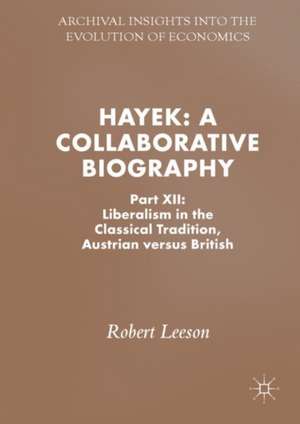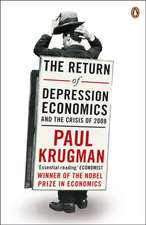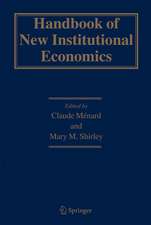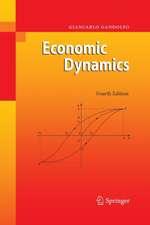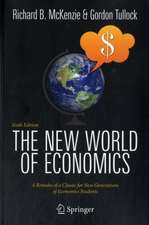Hayek: A Collaborative Biography: Part XII: Liberalism in the Classical Tradition, Austrian versus British: Archival Insights into the Evolution of Economics
Autor Robert Leesonen Limba Engleză Hardback – 24 mai 2018
Two concepts of civilization revolve around power – should it be separated or concentrated? Liberalism in the non-Austrian classical tradition remains fearful of power concentrated in the hands of government, labour unions or corporations; Red Terrorists sought to monopolize power to liquidate enemies and competitors as a prelude to utopia (the ‘withering away of the State’); and behind the ‘slogan of liberty,’ White Terror promoters (Mises and Hayek) sought to concentrate power in the hands of a ‘dictatorial democracy’ where henchmen would liquidate enemies, and – ‘guided’ by ‘utopia’ (the ‘spontaneous’ order) – follow orders from their social superiors. This volume, Part XII, examines the ‘free’ market Use of Knowledge in Society; examines the foundations of ‘free’ market educational credentials; and asks whether those funded by the tobacco industry and the carbon lobby should be accorded ‘independent policy expert’ status.
Preț: 699.92 lei
Preț vechi: 823.43 lei
-15% Nou
Puncte Express: 1050
Preț estimativ în valută:
133.94€ • 145.45$ • 112.51£
133.94€ • 145.45$ • 112.51£
Carte tipărită la comandă
Livrare economică 22 aprilie-06 mai
Preluare comenzi: 021 569.72.76
Specificații
ISBN-13: 9783319745084
ISBN-10: 3319745085
Pagini: 259
Ilustrații: XII, 414 p.
Dimensiuni: 148 x 210 mm
Greutate: 0.66 kg
Ediția:1st ed. 2018
Editura: Springer International Publishing
Colecția Palgrave Macmillan
Seria Archival Insights into the Evolution of Economics
Locul publicării:Cham, Switzerland
ISBN-10: 3319745085
Pagini: 259
Ilustrații: XII, 414 p.
Dimensiuni: 148 x 210 mm
Greutate: 0.66 kg
Ediția:1st ed. 2018
Editura: Springer International Publishing
Colecția Palgrave Macmillan
Seria Archival Insights into the Evolution of Economics
Locul publicării:Cham, Switzerland
Cuprins
1.‘Austrian Thought and Fascism’: ‘The victory of Fascism in a number of countries is only an episode in the long series of struggles over the problem of property.- 2. Persuade the intellectuals in the hopes that ultimately they could be converted and transmit my ideas to the public at large.- 3. Hayek and Aristocratic Influence.- 4. Pigouvian Market Failure.- 5. Britain, White Supremacism, and the International Right.- 6. The ‘Free’ Market ‘Emergency’ Demand for ‘Fascism.'.- 7.‘[Italian] Fascism.- 8. Austrian ‘Instincts,’ Serfdom, and Spanish and Portuguese ‘Fascism.
Notă biografică
Robert Leeson is Visiting Professor of Economics, Stanford University, US. He is a prolific researcher whose articles have appeared in the world’s leading general journals such as the Economic Journal and Economica. On a broad measure of publications, he was ranked joint 17th (with Nobel Laureate Paul Samuelson) in the list of the world’s top 500 economists on the basis of the number of journal articles included in the ECONLIT database of the American Economic Association. In addition to editing A.W.H. Phillips’ Collected Works in Contemporary Perspective, Leeson co-edited Milton Friedman’s Collected Writings. This is his 25th book.
Textul de pe ultima copertă
F.A. von Hayek (1899-1992) was a Nobel Prize winning economist, famous for promoting an Austrian version of classical liberalism. The multi-volume Hayek: A Collaborative Biography examines the evolution of his life and influence.
Two concepts of civilization revolve around power – should it be separated or concentrated? Liberalism in the non-Austrian classical tradition remains fearful of power concentrated in the hands of government, labour unions or corporations; Red Terrorists sought to monopolize power to liquidate enemies and competitors as a prelude to utopia (the ‘withering away of the State’); and behind the ‘slogan of liberty,’ White Terror promoters (Mises and Hayek) sought to concentrate power in the hands of a ‘dictatorial democracy’ where henchmen would liquidate enemies, and – ‘guided’ by ‘utopia’ (the ‘spontaneous’ order) – follow orders from their social superiors. This volume, Part XII, examines the ‘free’ market Use of Knowledge in Society; examines thefoundations of ‘free’ market educational credentials; and asks whether those funded by the tobacco industry and the carbon lobby should be accorded ‘independent policy expert’ status.
Two concepts of civilization revolve around power – should it be separated or concentrated? Liberalism in the non-Austrian classical tradition remains fearful of power concentrated in the hands of government, labour unions or corporations; Red Terrorists sought to monopolize power to liquidate enemies and competitors as a prelude to utopia (the ‘withering away of the State’); and behind the ‘slogan of liberty,’ White Terror promoters (Mises and Hayek) sought to concentrate power in the hands of a ‘dictatorial democracy’ where henchmen would liquidate enemies, and – ‘guided’ by ‘utopia’ (the ‘spontaneous’ order) – follow orders from their social superiors. This volume, Part XII, examines the ‘free’ market Use of Knowledge in Society; examines thefoundations of ‘free’ market educational credentials; and asks whether those funded by the tobacco industry and the carbon lobby should be accorded ‘independent policy expert’ status.
Caracteristici
Extensive use of archival material Considers how the free market relates to the tobacco industry and climate change Explores the relationship between power and liberalism
